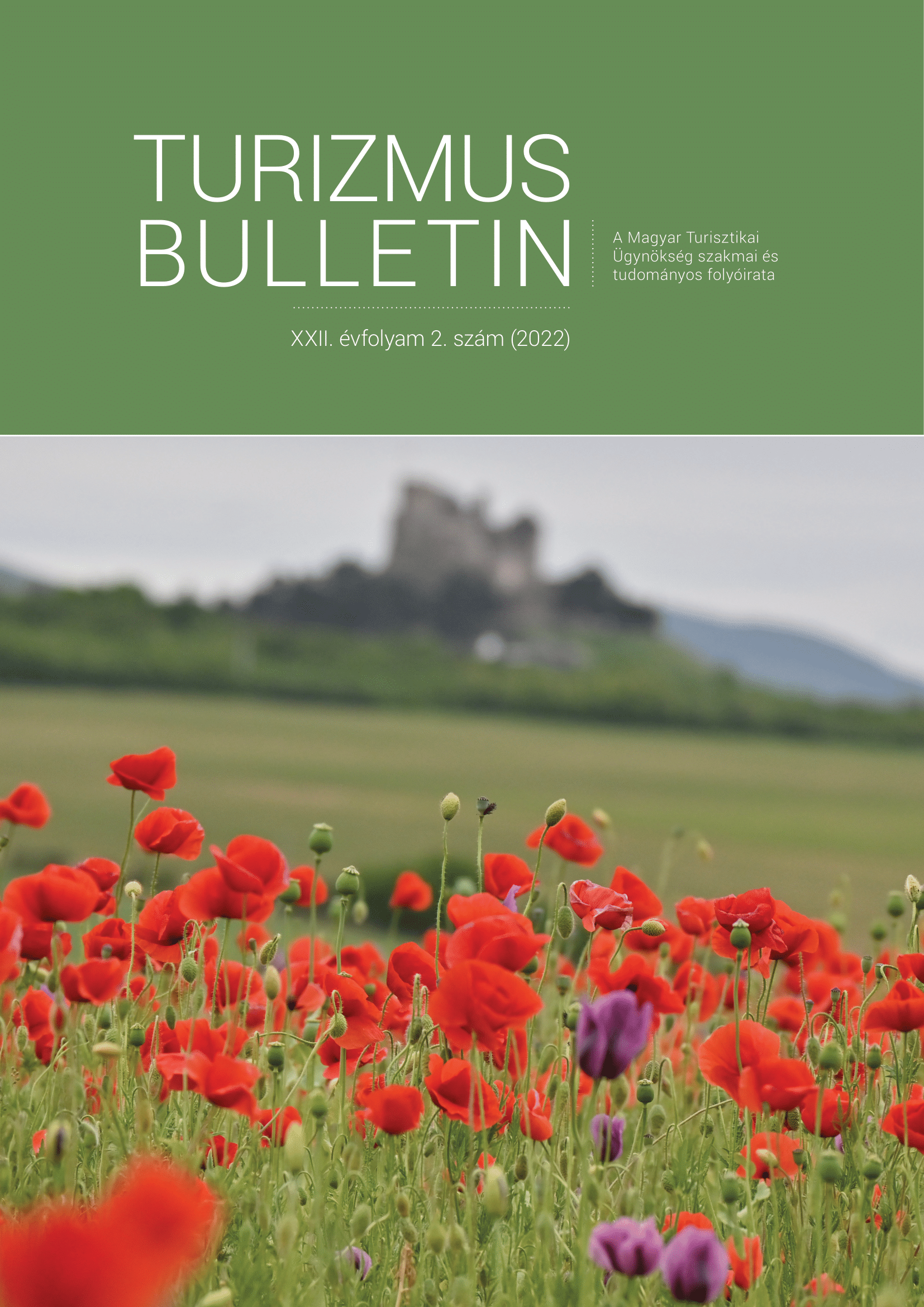Tourism and resilience
DOI:
https://doi.org/10.14267/TURBULL.2022v22n2.3Keywords:
resilience, sustainable development, shock effect, host areaAbstract
The study interprets the concept of resilience, which is used nowadays in more and more fields of science, and views it in the context of tourism. The interdisciplinary nature of the concept and its meaning in the various disciplines are presented. Domestic tourism research does not yet deal with the issue in sufficient depth, and the term resilience appears only in a few studies in the international literature on tourism. Examining the domestic and international literature, it can be concluded
that bringing the issue of resilience to the fore is in line with the failure to pursue sustainable development. Tourism, as one of the most dynamically developing economic sectors in the world, is largely responsible for the breakdown of sustainability. Some destinations have become so popular that the phenomenon of over-tourism has developed, which, as we have seen, can cause serious damage to the social and natural environment of the host area. However, in connection with the examination of the effects on the natural and social spheres of a host area, analysing the resilience and defences of the given destination, the issue of resilience will come to the fore more and more often in the following period.
References
BÁNDI GY. (2017): Fenntarthatóság, reziliencia, önkormányzatok. In: Fodor L. – Bányai O. (szerk.): Települési önkormányzatok szerepe a környezeti politika és jog alakításában. Kiadta az 1795-ben alapított Magyar Könyvkiadók és Könyvterjesztők Egyesülésének a tagja, DUpress, Debrecen. pp. 7–28. DOI: 10.5484/fodor_banyai_telepulesi_onkormanyzatok
BÉKÉS V. (2002): A reziliencia-jelenség, avagy az ökologizálódó tudományok tanulságai egy ökologizált episztemológia számára. In: Forrai G. – Margitay T. (szerk.): Tudomány és történet - Tanulmánykötet Fehér Márta tiszteletére. Typotex, Budapest. pp. 215–228.
BOGÁROMI E. – MALOTA E. (2017): Kulturális sokk és fogyasztói akkulturáció – kétirányú, interdiszciplináris megközelítésben. Vezetéstudomány – Budapest Management Review. 48(4). pp. 6–17. DOI 10.14267/VEZTUD.2017.04.03
BOURBEAU, P. (2013): Resiliencism: Premises and Promises in Securitisation Research. Resilience: International Policies, Practices and Discourses. 1(1). pp. 3–17. https://doi.org/10.1080/21693293.2013.765738
BULLA M. (2011): Sokféleség és sérülékenység. A resilience képesség társadalmi interpretálása. In: Tamás P. – Bull, M. (szerk.): Sebezhetőség és adaptáció. A reziliencia esélyei. MTA Szociológiai Kutatóintézet, Budapest. pp. 19–31.
CHANDLER, D. (2013): Editorial. Resilience: International Policies, Practices and Discourses. 1(1). pp. 1–2. https://doi.org/10.1080/21693293.2013.765739
CSAPÓ J. – GERDESICS V. – GONDA T. – RAFFAY Z. – TÖRŐCSIK M. (2018): Turizmus: a magyar lakosság turizmussal kapcsolatos beállítódása generációs szemléletű vizsgálattal. Kézirat. EFOP- 3.6.1-16-2016-00004 „Átfogó fejlesztések a Pécsi Tudományegyetemen az intelligens szakosodás megvalósítása érdekében”. PTE KTK, Pécs.
FEJÉRDY T. – Z. KARVALICS L. (2015): Kis-és közepes városok kulturális reziliencia-súlypontjai. Replika (94). 5. pp. 113–127.
GONDA T. (2017): A „tájzabálótól” a tudatos turistáig. A környezettudatosság erősödése a turizmusban. PTE KPVK, Szekszárd.
KEREKES S. (2011): Fenntarthatóság és társadalmi felelősség. A globalizálódó világ megoldatlan problémái. Magyar Bioetikai Szemle. 1. pp. 4–13.
LONGSTAFF, P. H. – ARMSTRONG, N. J. – PERRIN, K. – PARKER, W. M. – HIDEK, A. M. (2010): Building Resilient Communities: A Preliminary Framework for Assessment. Homeland Security Affairs. 6(3). pp. 1–23.
MAJTÉNYI GY. (2003): „Ön-fejűség” – a „másik” Németország történelme. Aetas. 18(1).
MASTEN, A. S. – WRIGHT, M. O. (2009): Resilience over lifespan: Developmental perspectives on resistance, recovery, and transformation. In: Reich, J. W. – Zautra, A. J. – Hall, J. S. (eds): Handbook of adult resilience. The Guilford Press, New York. pp. 213–237.
O’BRIEN, K. – PELLING, M. – PATWARDHAN, A. – HALLEGATTE, S. – MASKREY, A. – OKI, T. – OSWALD-SPRING, Ú. – WILBANKS, T. – YANDA, P. Z. – GIUPPONI, C. – MIMURA, N. – BERKHOUT, F. – BIGGS, R. – BRAUCH, H. G. – BROWN, K. – FOLKE, C. – HARRINGTON, L. – KUNREUTHER, H. – LACAMBRA, C. – LEICHENKO, R. – MECHLER, R. – PAHL-WOSTL, C. – PRZYLUSKI, V. – SATTERTHWAITE, D. – SPERLING, F. – SYGNA, L. – TANNER, T. – TSCHAKERT, P. – ULSRUD, K. – VIGUIÉ, V. (2012): Toward a Sustainable and Resilient Future. In: Managing the Risks of Extreme Events and Disasters to Advance Climate Change Adaptation: Special Report of Intergovernmental Panel on Climate Change. Cambridge University Press, Cambridge. pp. 437–486. https://doi.org/10.1017/CBO9781139177245.011
PIRISI G. (2017): A reziliencia szerepe a kisvárosok fejlődésében – egy komlói esettanulmány kapcsán. Településfejlesztési Tanulmányok. 6(2). pp. 75–88.
SZÉKELY I. (2015): Reziliencia: a rendszerelmélettől a társadalomtudományokig. Replika. 5. pp. 7–23.
SZOKOLSZKY Á. – V. KOMLÓSI A. (2015): A „reziliencia-gondolkodás” felemelkedése – ökológiai és pszichológiai megközelítések. Alkalmazott Pszichológia. 15(1). pp. 11–26. DOI: 10.17627/ALKPSZICH.2015.1.11
TAMÁS P. – BULLA M. (szerk.) (2011): Sebezhetőség és adaptáció. A reziliencia esélyei. MTA Szociológiai Kutatóintézet, Budapest.
WERNER, E. E. – SMITH, R. S. (1982): Vulnerable but invincible: A study of resilient children. McGraw-Hill, New York.
Internetes források
IZSÓ, G. (2014): Human Dynamics. http://humandynamics.hu/index.php?option=com_content&view=article&id=84:resilience-azaz-reziliencia&catid=39:vezetoi-coaching, Letöltve: 2021. augusztus 28.
SZERINÉ DR. ORMÁNDI E. (2019): Reziliencia és megküzdés. Mindset Pszichológia. https://mindsetpszichologia.hu/reziliencia-es-megkuzdes, Letöltve: 2020. október 25.
THE WORLD BANK (2020): Travel and Tourism direct contribution to GDP. https://data.worldbank.org/indicator/ST.INT.ARVL?locations=ID-LK-TH&name_desc=false, Letöltve: 2021. október 20.
THE WORLD BANK (2021): International tourism, number of arrivals – Indonesia, Sri Lanka, Thailand. https://data.worldbank.org/indicator/ST.INT.ARVL?locations=ID-LK-TH&name_desc=false, Letöltve: 2021. október 20.
UNWTO (2018): World Tourism Barometer and Statistical Annex. June 2018. https://www.unwto.org/global/publication/unwto-world-tourism-barometer-and-statistical-annex-june-2018, Letöltve: 2020. október 25.

